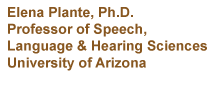  |
||
The Plante laboratory is directed by Dr. Elena Plante. Laboratory operations are overseen by Mrs. Rebecca Vance. The laboratory includes students at all stages of their education, from undergraduate to doctoral and postdoctoral levels. Undergraduate and Doctoral students represent a variety of majors (e.g., Speech, Language & Hearing Sciences, Psychology, Pre-Med, Engineering). Students in the graduate clinical training program in Speech-Language Pathology are also active in the lab.
Although much is known concerning the expressive language deficits of children with language impairment, comparatively little is known about their receptive abilities. Even less is known about these skills in adults who evidence poor language skills. Behavioral studies currently focus on two groups: children with specific language impairment (SLI) and adults with developmental language disorders (e.g., SLI, Learning Disabilities). Parallel studies involving children and adults are focused on the ability of these individuals to extract information on language structure from speech. By understanding what information these individuals extract, and under what processing conditions, we may be able to provide better guidance for the development of improved therapy methods. The lab is currently conducting two types of neuroimaging studies. Functional neuroimaging studies currently examine the brain resources recruited in language processing. Studies directed by affiliated lab faculty member, Dr. Thomas Christensen, use fMRI to examine how verbal processing, memory, and attentional interact to support performance on verbal processing tasks. Additional studies examine how activation in brain regions changes during language learning. These studies are intended to lay the groundwork for studies that examine individuals with disorders that may disrupt language, verbal memory, attention, or any combination of these skills. Diffusion Tensor Imaging (DTI) and structural magnetic resonance imaging (MRI) studies are being used to understand how brain status might predict memory performance in the context of normal aging. This work is conducted in collaboration with Drs. Cyma Van Petten, Diane Patterson, and Betty Glisky in the Department of Psychology.
Examples of publications that reflect the lab's current areas of research focus include the following: Bahl, M., Plante, E., & Gerken, LA. (2009). Processing prosodic structure by adults with language-based learning disability. Journal of Communication Disorders, 42, 313-323. Greenslade, K.J., Plante, E., & Vance, R. (2009). The Diagnostic Accuracy and Construct Validity of the Structured Photographic Expressive Language Test – Preschool: Second Edition (SPELT-P2) Language, Speech, and Hearing Services in Schools, 40, 150-160. Christensen, T., Antonucci, S., Lockwood, J.L., Kittleson, M. & Plante, E. (2008). Cortical and subcortical contributions to the attentive processing of speech. NeuroReport, 1, 1101-1105. Spaulding, T.J., Plante, E., & Vance, R.B. (2008). Sustained selective attention skills of preschool children with specific language impairment: Evidence for separate attentional capacities. Journal of Speech, Language, & Hearing Research, 51, 16-34. Fisher, J., Plante, E., Vance, R., Gerken, LA, & Glattke, T.J. (2007). Do Children and Adults With Language Impairment Recognize Prosodic Cues? Journal of Speech, Language, & Hearing Research, 50, 746 - 758.
|
||